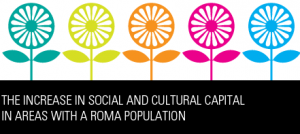The Developmental Research Center for Pedagogical initiatives Step by Step at the Educational Research Institute in Slovenia was involved in the three-year project “The increase in social and cultural capital in areas with a Roma population” (July 2010 – August 2013). It was funded by the European Union (EU) through the European Social Fund (ESF) and the Slovenian Ministry of Education, Science and Sports.
 The primary aim of the project was to create conditions that would allow the members of the Romani community to escape the vicious circle of social exclusion. This circle could only be broken by adequate investments in social and cultural capital in the environments, populated by the members of the respective community. The project highlighted education as the most efficient way out. Its objectives were to increase the level of education of the Romani community members and to raise awareness about the significance of education as the fundamental factor in the progress of the community.
The primary aim of the project was to create conditions that would allow the members of the Romani community to escape the vicious circle of social exclusion. This circle could only be broken by adequate investments in social and cultural capital in the environments, populated by the members of the respective community. The project highlighted education as the most efficient way out. Its objectives were to increase the level of education of the Romani community members and to raise awareness about the significance of education as the fundamental factor in the progress of the community.
The Developmental Research Center for Pedagogical initiatives Step by Step at the Educational Research Institute in Slovenia was one of the six consortium partners and its main goal was to promote and implement different educational activities for Romani pre-school children and their families. 12 kindergartens and 7 primary schools from different parts of Slovenia were included in pre-school education project activities :
- Advocacy, informing and awareness raising activities in professional circles and the general public about the importance of knowledge and education for raising the social and cultural capital of Romani community members and to break the circle of social exclusion and about the social justice in education;
- Development and implementation of different forms of educational work for pre-school children and their families, as well as for children who are about to start school and their families: introduction and animation days in kindergartens and schools, kindergarten activities for children who do not attend kindergartens and their families, creation and implementation of culturally and linguistically appropriate didactic materials, learning second language and bilingualism in kindergarten);
- Programs for empowering Romani families with regard to childcare and encouraging child development.
The external evaluation in the field of pre-school education activities was carried out by the representatives of Educational Research Institute in Slovenia and its project partners (kindergartens and primary schools) in June 2013. 90.6 % of all practitioners involved in the project took part in the external evaluation. They indicated both advantages and difficulties the project brought about. The advantages were:
- the number of Romani children enrolled increased into pre-school education;
- children`s and parents` confidence in the kindergarten and their personnel was established;
- the participants appreciated the access to professional didactic materials and handbooks: trilingual picture books with handbooks for practitioners, trilingual picture dictionaries, grammar of Prekmurian Romani language, materials for empowerment of Romani families;
- they received professional support for and monitoring of their work: they enjoyed the opportunity for getting feedback, being evaluated and participating in team work;
- they received numerous high quality trainings;
- they had the opportunity for individual work with Romani children and their families;
- contributed to decreasing the number of stereotypes and prejudices.
The practitioners have also faced difficulties:
- too much bureaucracy and documentation (required by funders of the project)
- facing the spatial and time challenges
- conflicts with other kindergarten personnel (prejudices, non-acceptance of diversity, verbal assault)
- a lack of interest of Romani parents
- low participation of Romani parents in prepared activities, language barriers, non-understanding and demanding intensity of the project.
You can find more about the project activities, their implementation and evaluation, examples of good practice, external evaluation and achieved indicators in the science monograph: Vonta, T. (ur.) (2013). Začnimo na začetku: prispevek predšolskih programov k socialni vključenosti Romov. Ljubljana: Pedagoški inštitut (e-version available here) and on the project website.
Samanta Baranja is a researcher at Educational Research Institute.
Tags: Development, Roma

at 6:42 pm
Extremely teaching story, saved your website regarding hope in order to learn more!